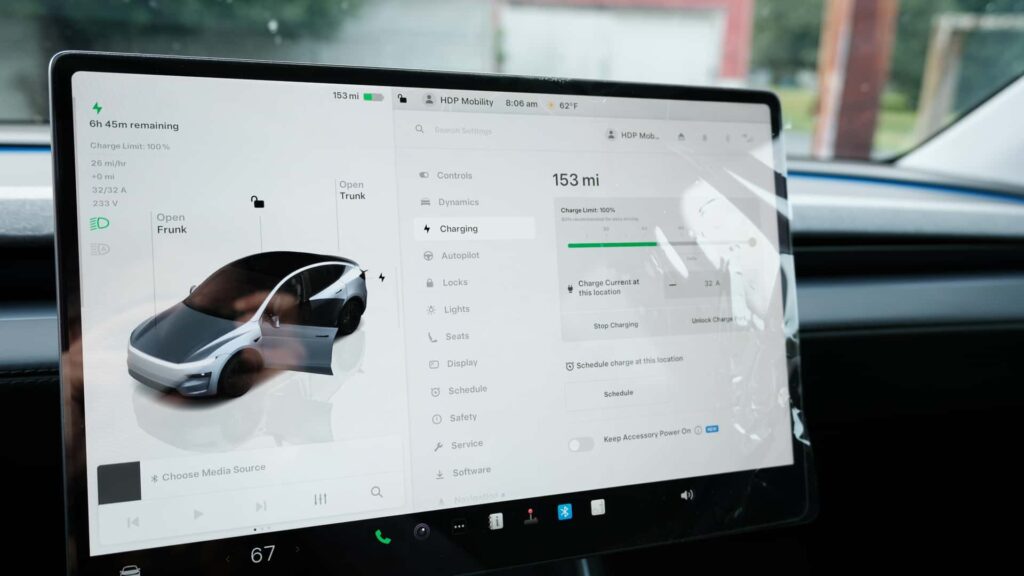Apparently Tesla really is worried about its struggling car sales, despite CEO Elon Musk’s grand plans to leave the relatively boring automotive business behind.
The automaker is working to integrate Apple CarPlay into its cars, Bloomberg reported on Thursday, citing people familiar with the matter. It would be a huge about-face for the company that pioneered sleek, highly updatable and feature-packed vehicle infotainment systems developed completely in-house.
It’s unexpected. But it could be a smart move for Tesla to broaden its appeal. And if the original anti-CarPlay auto brand embraces Apple’s ecosystem, it may settle the “to CarPlay or not to CarPlay” debate once and for all.
Tesla has started testing CarPlay internally and has discussed launching it publicly in the coming months, Bloomberg reported. A release date hasn’t been finalized, and Tesla has also been known to scrap features before they launch, the outlet noted.

CarPlay will reportedly assume a window with the wider Tesla interface, rather than taking up the whole screen like it does in other cars.
Photo by: BMW
What would it look like? According to the report, CarPlay would occupy a window within the wider Tesla user interface. So, it sounds like drivers would be able to interact with other Tesla features and apps while also running CarPlay at the same time. CarPlay could provide easy access to the apps customers use on their phones but can’t access natively through their Tesla, like Google Maps.
In other cars, CarPlay takes up a car’s entire infotainment screen, essentially acting as a new interface that offers similar functionality to one’s smartphone. But Tesla’s plan makes sense, given that it’s known for its signature touchscreens and top-tier software features.
Is it a smart move? Given Tesla’s struggles to grow its car sales over the last couple of years, it may be. Introducing a Cybertruck, a new Model 3 and a new Model Y has, at best, helped Tesla maintain sales. Free Supercharging and trials of Full Self-Driving (Supervised) did little to move the needle either, and Tesla will likely end 2025 with fewer global deliveries than last year.
For years, Tesla’s sales rocketed upward because enthusiastic early adopters were dazzled by its cars’ electric performance and flashy technology. Now it’s hitting a wall. As the entire EV industry attempts to reel in a more mainstream crop of buyers who need extra convincing to go electric, Tesla may need to do more to cater to those folks.
And if there’s one thing car buyers in America love, regardless of brand loyalty or anything else, it’s CarPlay. A McKinsey study found that roughly a third of car buyers would not consider a vehicle without CarPlay or Android Auto. So CarPlay may be a reasonably simple, no-brainer way to juice sales. There likely isn’t another single car feature that has that power.
The larger question is what this decision would mean for the rest of the auto industry, if it comes to pass. Is this nothing more than a Hail Mary to squeeze out a few more Tesla sales from buyers on the fence? Or is it a sign that CarPlay is simply too entrenched in peoples lives for any car company to ignore—even the mighty Tesla?

Tesla, Rivian and General Motors have resisted offering Apple CarPlay in their EVs.
Photo by: InsideEVs.de
Rivian doesn’t offer CarPlay or Android Auto either, and its leadership has shown zero interest in changing tack. The startup thinks it’s crucial to control a customer’s entire digital experience, despite regular prodding from its customers.
General Motors has caught an immense amount of heat for dropping CarPlay from its electric vehicles. And it recently doubled down when CEO Mary Barra told The Verge that it plans to do the same for its combustion cars in the future. Meanwhile, Apple is making inroads deeper into cars. It recently launched CarPlay Ultra, which will essentially replace a car’s entire digital interface—from its speedometer to its climate controls and entertainment functions.
In the past, car companies have—by and large—followed in Tesla’s footsteps. The EV maker pushed the industry to take electric cars seriously, to make vehicles more software-driven, to slap huge touchscreens in their cars, and to work on their own elegant infotainment systems to run on them.
Whether this news will influence the other no-CarPlay holdouts is still TBD. What’s clear is the battle over your car’s screen is far from over.
Contact the author: Tim.Levin@InsideEVs.com

